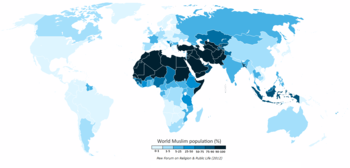 |
| The Muslim population of the world map by percentage of each country, according to the Pew Forum 2009 report on world Muslim populations. (Photo credit: Wikipedia) |
From the handful of YouTube videos I have watched, primarily from people based in the U.K. (here's one example), I have the impression that the problem - or at least the potential for waves of migrants from predominately Muslim countries to become a problem - is much greater than what I am hearing from the corporate news media in the U.S. It is also clear from a recent poll of Muslims living in Britain, which actually has received some attention from our corporate news media, that many Muslims who already live there have values which are at odds with much of the rest of society. It seems reasonable to expect that bringing in large numbers of Muslims might have a real impact on Britain and other countries.
On one hand, I can see why admitting immigrants, especially those who are refugees or in dire need of assistance for other reasons, is admirable. The humanitarian "spirit" leads people in many of the host nations to want to help. On the other hand, I can imagine how the influx of large numbers of immigrants without adequate systems in place could be overwhelming. When some of the immigrants cause problems by acting in accordance with their cultural values rather than those of the host nation, I can also understand how resentment can quickly build.
From what I can tell, it appears that the political left in some of these nations may be taking in more immigrants at a faster pace than they can reasonably handle while simultaneously refusing to acknowledge that many aspects of Islam stand in sharp contrast to the Enlightenment values that have served us so well. This seems like a recipe for disaster no matter how well-intentioned it might be. And from what I can tell, the political right in some of these nations is growing rapidly as a direct result of these policies. Backlash in the form of anti-immigrant attitudes is an unfortunate but understandable reaction to a problem without an obvious solution.
Looking into the near future, it seems fairly safe to make at least two predictions about what we are likely to see if immigration from predominately Muslim nations continues at anywhere near the present rate. First, un-assimilated immigrants will continue to cause problems, as aspects of the cultural values they have brought with them, including but not limited to Islam, conflict with Enlightenment values. The regressive left has been unwilling to acknowledge this reality, and this seems to be playing a part in fueling the rise of the right. Second, a particularly xenophobic and anti-immigrant faction on the right will likely emerge to cause problems, as aspects of these values will conflict with the predominately tolerant atmosphere the left has attempted to cultivate.
Many have suggested that the repeated refusal of many on the left to deal with the threat posed by Islamism is driving the growth of the right. If this is accurate, and I suspect that it is, then it would seem important for those of us on the left to apply the same sort of critical scrutiny to Islam as we do to Christianity. It is time for the left to stop giving Islam a pass and to recognize that liberal criticism of Islam is of vital importance if we do not want to cede the argument to the right. We can criticize Islam without resorting to anti-Muslim bigotry, and we can support sensible immigration policies without becoming xenophobes.
If we aren't willing to do this, we can be fairly confident that someone far less reasonable is going to take up the problem on our behalf and out of frustration at our refusal to act. And something tells me that we might not like their solution.